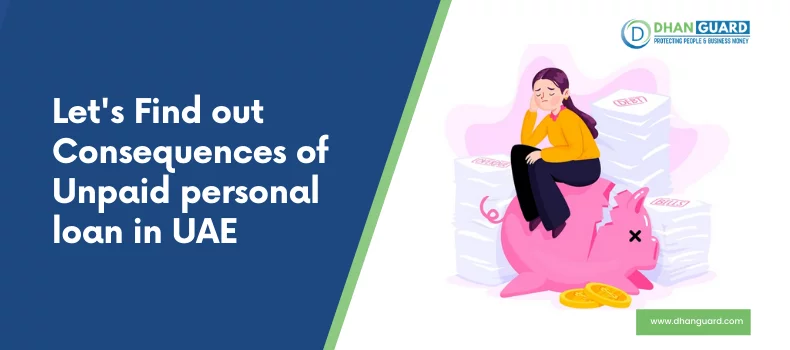When a borrower is given a personal loan, banks and other financial institutions make care to collect checks as collateral for the loan amount. This is done in addition to the terms and conditions of a personal loan agreement that has been signed.
In the United Arab Emirates, an unpaid personal loan can have serious implications. Defaulters are people who fail to pay their personal loan EMIs on time, resulting in their being unable to pay off their outstanding debts within the agreed-upon time frame. Failure to make your monthly repayments can have serious consequences.
Each bank has its own set of restrictions and conditions when it comes to non-payment or missed EMIs on personal loans.
Types of Unpaid Personal Loan Defaulters in UAE
The majority of financial institutions and banks divide personal loan defaulters into two groups:
Minor Payment Defaults
Minor payment defaults are defined as loan accounts with a loan non-payment duration of less than 90 days. Borrowers with minor defaults on their unpaid personal loans in the UAE can recover from the negative effects of the default on their credit score pretty quickly.
Major Payment Defaulters
Major payment failures are defined by several organisations as circumstances in which the borrower's payments for an overdue personal loan in UAE 2021 exceed 90 days. Most banks and financial organisations will not lend to those who have a history of major payment defaults on their credit reports. When a person's loan payments are past due for more than 90 days, the loan is classified as a non-performing asset (NPA).
Consequences of an unpaid personal loan in UAE
The following are the consequences of failing to make personal loan EMI payments in the United Arab Emirates:
It has an impact on your credit score
A credit report keeps track of all financial activities related to a loan that an individual has taken out. This comprises all payment information, such as the amount and due date of EMIs, that is used to determine a person's credit score. All unpaid debts and late payments are reported as such, lowering a person's credit score. Even missing one payment can result in a credit score drop. As a result, an unpaid personal loan in UAE 2021 can destroy a person's credit rating, making future loans extremely difficult.
Having an impact on future borrowing
Every lender examines your credit score as well as your credit report in order to assess the risks of granting you a loan. Every time you apply for a loan, they do so to determine your financial stability. Because you have a bad credit score as a result of an unpaid personal loan in the UAE, the finest personal loan providers are unwilling to lend to you. Even if some of them decide to make an exception, they may do so by lending you a smaller sum at a higher interest rate.
Agents who collect debts
If the default period of an unpaid personal loan in UAE 2021 has passed 90 days, banks and financial institutions may employ debt collection agents to reclaim the loan. The banks send a notification to the borrower, giving them 60 days to repay the debt or else the account would be marked as non-performing. It's best to keep things from spiralling out of control because it can be quite distressing.
Charges of Punishment
Late payments or non-payment of EMIs might result in the borrower being charged additional fines and fines. The borrower will be charged an additional late payment fee if the EMI payment is made after the due date or during the grace period. They will be classed as a defaulter if they delay the payment any longer, and they will be charged interest on the unpaid personal loan in UAE.
Loan defaults can be avoided in the following ways
While it is preferable to prevent a loan default at all costs, if one does occur, a borrower has a few options to consider:
- Make good financial decisions.
- If you think you'll have trouble repaying your personal loan in the UAE in 2021, ask for a reduced EMI.
- Making portion payments to lessen your financial stress is another preventative measure.
- Request an EMI-free time from the bank if you lose your job and are unable to make your payments.
- To avoid defaulting on a personal loan, you can apply for Personal Loan Insurance.
Legal Consequences for Unpaid Loan
After a thorough examination and verification, UAE banks issue a loan. Defaulting should never happen if your finances are well-planned. However, life is unpredictable, and an unforeseen circumstance may result in debt default or delinquency. It may also occur if you do not take instalment payments seriously or if you are not diligent in repaying your debt.
Unpaid debts are treated as a criminal infraction in the UAE, unlike in many other nations where they are treated as a civil matter. When you take out a loan from a bank or financial institution in the UAE, you must repay it according to the terms of the agreement, and unpaid loans might land you in legal trouble.
In all circumstances, the bank officials attempt to contact you directly for payment of your overdue loans in the UAE. If you still don't pay or react, they'll deposit the security checks you gave them when you applied for the loan. If it clears, that's great; however, if it bounces owing to a lack of funds in your account, it's reported to the police and a case is filed against you.
Conclusion
Debts bear the brunt of responsibility as well as risk. As a result, it's critical to assess the strategy before borrowing. Maintain a solid credit report by staying on top of your personal loan EMI payments. Taking these steps will ensure that your financial independence is preserved!
DhanGuard: All-in-One Solution for Business Setup in Dubai, UAE
DhanGuard is your ultimate one-stop solution for all your business needs. Whether you’re planning to set up a new company or expand your existing business in the UAE, we’ve got you covered with our comprehensive range of services. From Business Setup in UAE and Company Formation in Dubai to managing your financial and legal compliance, we provide everything you need under one roof.
Our services include:
- Company Formation in UAE and Dubai
- Opening a Business Bank Account in UAE and Dubai with a 99% success rate
- VAT & Corporate Tax Compliance
- Accounting, Bookkeeping, and Auditing Services
- Trade License Renewal
- Golden Visa Assistance
Let DhanGuard make your journey of Business Setup in Dubai seamless and hassle-free!








